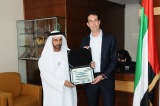Dubai, UAE – Philips, the global leader in lighting, has become the first lighting company to receive a provisional accreditation as an Energy Service Company (ESCO). The ESCO accreditation scheme was developed by the Regulatory and Supervisory Bureau (RSB) to regulate the ESCO market in Dubai. Philips meets all required criteria decreed by the RSB and is now allowed to undertake and deliver lighting retrofit projects through the ESCO model. ESCO accreditation applicants need to provide sufficient evidence on the required energy auditing capabilities and tools to handle ESCO projects, as well as share reference projects, demonstrate financial strength and a strong presence in Dubai.
With the rapid growth of Dubai’s economy, the demand for electricity and water supply has increased as well. ESCO provides a broad range of energy solutions including designs and implementation of energy-savings projects, retrofitting, energy conservation, energy infrastructure outsourcing, power generation, energy supply, and risk management. The ESCO accreditation allows Philips to support Dubai’s vision to become an internationally- recognized energy-efficient city.
Rami Hajjar, General Manager of Philips Lighting in the Middle East, said: "As part of our corporate goals, we encourage the use of energy-efficient lighting in Dubai through the introduction of the most innovative technologies in the lighting field, which we now also offer through the ESCO model which is relatively new to the Middle East region. We are proud to be the second region within Philips to receive accreditation as an ESCO after China. This is a key milestone, allowing us to enter and compete in a new domain of services."
The accreditation only strengthens Philips position as the leader in energy-efficient lighting across the region. Earlier this year, in January 2015, Philips was awarded the DEWA Power Plant lighting refurbishment project by Etihad-ESCO, which is scheduled to be completed over the course of the year. The project is based on the ESCO business model, which means that Philips will implement and maintain the lighting infrastructure for a period of five years, while also providing guarantees on energy savings and lighting levels.
The project targets DEWA power plants with the aim to retrofit the energy inefficient buildings in order to save electricity and water used by these buildings. It is in line with the 'Green Economy for Sustainable Development' and is aligned with the Dubai Integrated Energy Strategy 2030 of reducing energy demand by 30% in that same year. The overall energy savings target is 1.7 terawatt annually by 2030.
"For Philips, it isn’t about the individual product specifications. Rather, the key outcomes are savings, lighting levels and uptime, which we guarantee for the complete duration of the contract," said Rami.
